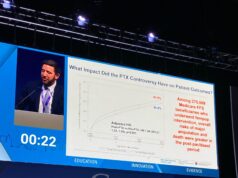The three-year outcomes from the Belgian Absolute Trial assessing the safety and performance of the Absolute Self Expandable Nitinol Stent (Abbott Vascular) for the treatment of atherosclerotic lesions of the superficial femoral artery (SFA), showed that the three year primary patency rate was achieved in 77.7% of patients, and limb salvage was 100%. A 1% fracture rate was demonstrated after one year.
The results were presented at the recent CIRSE meeting held in Copenhagen, Denmark, by Dr Herman Schroë, Genk, Belgium. The study, entitled ‘Absolute Self Expandable stent in the treatment of Superficial Femoral Artery atherosclerotic lesions’, was a multi-centre, prospective, non-randomised trial involving 101 patients with symptomatic peripheral artery disease (PAD) due to femoral occlusive disease.
Patients included were those with symptomatic PAD (Rutherford stages 3 to 5), >50% stenosis of the ipsilateral SFA, lesion length >30mm and less then 90mm, and at least one patent crural run-off vessel. The mean length of stenosis was 57mm. Excluded patients were those with, previous ipsilateral femorodistal bypass surgery or ipsilateral SFA stenting, untreated inflow disease, and known intolerance to clopidogrel, aspirin or contrast media.
The results at 12 months showed that primary patency was achieved in 87.3%, secondary patency was achieved in 94%, and limb salvage rate was 100%. Target lesion restenosis (TLR) was 12.7%, target vessel restenosis was 15.9%, and target vessel revascularisation was 7.3%. It was reported that there was one stent fracture at one year. At three years, primary patency was achieved in 77.7% of subjects, limb salvage was 100%, TLR 22.3%, target vessel revascularisation 18%, and target vessel restenosis was 30.3%.
“This is the first prospective trial on a homogenous group of treated patients with a prospective follow-up of three years,” commented Schroë. In comparison with the 12 month results from the FAST, Vienna, and RESILIENT trials, primary patency, i.e. freedom from binary restenosis, is achieved in a higher percentage of patients in the Absolute trial (68.3%, 63%, 81%, vs. 87.3%, respectively). The mean lesion length was longer than in the FAST trial, comparable to the Resilient and shorter than in the Vienna trial. Given the “excellent” freedom from binary restenosis result at three years (77.7%). Schroë said that the Absolute stent appears to perform very well in the treatment of atherosclerotic lesions in the SFA also in the long-term. The low fracture rate is a confirmation of the results in other studies and can be explained by the electropolishing and low axial stiffness, he added.













